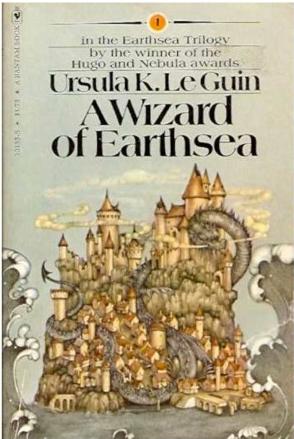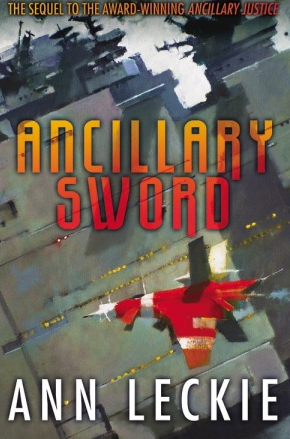
Ursula K. Le Guin, giving her acceptance speech at the National Book Awards, stated that we needed writers who knew “the difference between the production of a market commodity and the practice of an art. Developing written material to suit sales strategies…is not quite the same thing as responsible book publishing or authorship.” Le Guin posited that Science Fiction and Fantasy (SF/F) were tools for imagining alternatives to capitalism.
A week prior to the National Book Awards, The Guardian published an article by Oscar Williams covering the Mindshare UK event, where Buzzfeed UK’s creative director and an event representative argued that Science Fiction over the last twenty years had become less imaginative. “[M]ore recent sci-fi film and literature has been less ambitious and…this could hamper future innovation.” They referenced 2001: A Space Odyssey’s Hal 9000 and compared him/it with Apple’s Siri, mentioned the touchscreens featured in Minority Report, and “the 70 predictions made in 1984 that have now been realised.”
A little over a month later, The Guardian published another article on the climate of SF/F, this time by Damien Walter, positively noting that 2014 was the year that the genre “woke up” to diversity, naming, amongst several titles, Anne Leckie’s Ancillary Justice, which reimagines the importance (or lack thereof) of gender. Leckie’s novel won the Hugo, Nebula, Clarke and BSFA awards and some of the best novels of 2014, Walter notes, were from the science-fiction and fantasy genres. Of course, awards organizations haven’t completely ignored diversity. I recently finished The Snow Queen by Joan D. Vinge, a science-fiction epic that contains substantial gender and racial diversity and that won the Hugo Award in 1981. However, Walter rightly points to the increasing volume and acceptance of these works by readers and publishers.
Within the span of one month, we have contradictory viewpoints about what makes “good” science-fiction and fantasy and apparent agreement that these genres should be instrumentalized to serve social purposes.
I read the comments by Buzzfeed’s creative director with irritation and wondered if he was blithely ignoring the tomes of interesting science-fiction literature being produced by authors like China Mieville, G. Willow Wilson, Kameron Hurley, Ken Liu, Cory Doctorow…and on and on and on I could go. However, his comments became more understandable upon realization that “good” science fiction was being defined as science-fiction-that-will-let-us-invest-in-more-gadgets. Using this reasoning, a time machine should be produced so a time traveler can invest in historically low-cost real estate. Good science-fiction becomes a mechanism which assists in the production of capitalist expansion, of “innovation.”
Despite Le Guin’s appeal that “[t]he profit motive often is in conflict with the aims of art,” science fiction and fantasy is often complicit with the growth of private enterprise and with Le Guin’s other pet peeve, state-sanctioned militarism. The United States military provides material resources to Michael Bay. Newt Gingrich wrote the forward for William R. Forstchen’s One Second After, a novel that features an electromagnetic attack on the United States, which Gingrich argues that the country must be prepared to encounter. Both the American and Canadian militaries have recommended reading lists for their personnel that include several science-fiction titles like Starship Troopers, China Attacks, and The Third World War. Science Fiction and Fantasy have also been instrumentalized to serve the interests of a central authority that(allegedly) has a monopoly on legitimate political violence: the state.
In her acceptance speech, Le Guin framed science fiction and fantasy as potential disrupters to the status quo. From this lens, science-fiction and fantasy function as mechanisms that de-socialize readers from normalized assumptions about how the world should work. I’m very sympathetic to this view and at a conference I attended in November, I argued that SF/F was explicitly engaged in recreating normative standards.
By arguing that fantastical texts influence the social world, Le Guin invites the social sciences to meet with and consider fiction seriously. As a student of international relations (IR), I find that SF/F is particularly suitable for my discipline because of the genre’s emphasis on concise world-building. Consequently, I’m more than happy to include SF/F in my scholarly presentations and research–with the understanding that fiction shouldn’t be viewed as possessing a special monopoly on truth and fiction writers are not prophets whose visions have greater status than ordinary workers. Le Guin isn’t naïve about SF/F, though: the subtitle for The Dispossessed is An Ambiguous Utopia, after all.
Unfortunately, the kind of intellectual disruption advocated by Le Guin often comes at a cost. As Le Guin points to sales departments’ influence on book purchasing and publishing, researchers are also restricted by scholarly expectations; certain journals will only publish articles with specific theoretical orientations and scholars who challenge the limits of a particular discipline risk limiting their publication and employment opportunities. So too does the fiction industry prioritize certain trends over others, though perhaps SF/F publishers are more receptive to alternative realities, as long as the world-building is rigorous and systematic. Still, those researchers and authors who do not have social clout are more likely to tread cautiously and produce work that fits into already identifiable boundaries.
There are always exceptions, obviously, and the Guardian article on diversity in SF/F illustrates that the industry may be undergoing a transition. Notably though, even Le Guin had to stealthily insert that Ged, one of her most famous protagonists, was a person of colour later into the story than right at the outset of the novel. This writing decision wasn’t a result of publisher pressure, but because Le Guin feared that her readers may not “immediately identify with a brown kid.” Some of the early covers of the Earthsea series featured a white protagonist, and when the Sci Fi Channel televised the EarthSea series, Le Guin wrote in Slate that the channel “wrecked” her books by whitewashing her characters. SF/F’s influence on revolutionary change becomes slightly questionable in the context of gatekeepers who prioritize incrementalism. There is also the shadow of the reader hanging over the author’s head, where even writers like Le Guin have adjusted their writing to real-world constraints like racism. Hiding Ged’s skin colour could be interpreted charitably. By slowly introducing the idea that PoC characters can be likeable, Le Guin uses fiction as an emancipatory mechanism. This decision could also be less kindly described as a form of self-policing which compromises the radicalness of her project. SF/F can de-socialize readers, sure, but what happens when writers are socialized by their readers into writing more “palatable” literature?
Perhaps some would laugh at the idea that there’s any connection between elves and the social sciences. I once heard a professor express confusion at the popularity of fantasy fiction because “elves aren’t real.” But sovereignty, statehood, nationhood, and citizenship are constructed ideas (and still remain ideas; you certainly can’t touch sovereignty though we feel its effects) with very real material consequences. The boundaries between knowledge/practice and reality/fiction aren’t particularly clear, especially if we view texts, both realist and fantastical, as socializing forces. I would argue against positing a stark difference between an “idea” and an “action,” as most norms gain status as “common sense” through practice.
The selection process for deciding what is a “better” or “worse” text is valuable and eventually a judgment must occur on what works merit publication. This process involves a set of standards or codes that aspiring scholars and writers follow. But this process becomes problematic if the work that is selected for publication becomes repetitive and unquestioned, like a fantastical trope that becomes a sacred cow that prevents better stories from emerging (I’m looking at you, “hero’s journey.” You’re good, but we treat you like a rule instead of a suggestion.) Science Fiction and Fantasy have their own ontological starting points, their own boundaries, and prioritize certain ways of thinking. The very structure of a book is a boundary, and so places an actual physical limit on the author’s imagination. Fantastical fiction isn’t the holy grail and isn’t the answer to all of our problems. But as an exercise in deconstructing entrenched beliefs, SF/F can behave like a remedy to tired ways of thinking.
I do not want to turn science fiction and fantasy into a second-class citizen, where the purpose of the genre is to serve the interest of other disciplines or industries. I recognize that this article treats literature instrumentally and not as a good in its own right. My aim isn’t to oppose “literature for literature’s sake,” but to recognize that people will, inevitably, use texts to create personal meaning and to understand the world. Le Guin’s acceptance speech was too clean and employed a narrative that treated SF/F as a monolithic force for good, if only those pesky capitalists could leave art alone. Le Guin’s optimism is understandable as one is generally gracious when accepting an award, after all. However, as a graduate student, I am always troubled by optimism (kidding, maybe.) Still, the increasing diversity in SF/F is a positive sign that the industry is capable of self-criticism and adapting to new ideas. This change should render readers hopeful that SF/F can do what Le Guin promises: destabilize comfortable ideas.
***************
Sarah Shoker is a PhD student in Political Science at McMaster University, where she once used Lord of the Rings in a presentation to explain a Foreign Policy conundrum. She regularly quotes from Harry Potter to her more respectable colleagues. You can follow her on twitter @SarahShoker.
**I would like to thank my colleague, Ira Lewy, for first informing me about military reading lists and the navy’s rather unfortunate decision to assist Michael Bay in producing more movies.
 I’m currently whipping through Ann Lecki’s Ancillary series. It’s great fun; page turning space opera adventure with twisty plots and thoughtful meditations on justice, identity and gender along the way. I love the LeGuin/Butler/Russ/etc. tradition of feminist sci-fi, and Leckie does too, so that makes me happy.
I’m currently whipping through Ann Lecki’s Ancillary series. It’s great fun; page turning space opera adventure with twisty plots and thoughtful meditations on justice, identity and gender along the way. I love the LeGuin/Butler/Russ/etc. tradition of feminist sci-fi, and Leckie does too, so that makes me happy.
